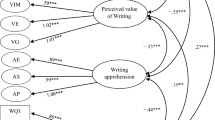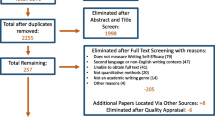Abstract
Most studies of academic self-efficacy have been conducted with culturally Western populations, with very few studies exploring the self-efficacy beliefs of South Asian or South Asian immigrant populations. This study examined the spelling and writing self-efficacy beliefs of 151 South Asian (Indo-Canadian Punjabi Sikh immigrants) and Anglo-Canadian early adolescents. Domain-specific self-efficacy was a strong predictor of spelling and writing performance for both cultural groups. Male Indo-Canadians scored significantly lower than female Indo-Canadians on most measures of performance and self-efficacy. The findings were situated in relevant cross-cultural self-efficacy research and the current multicultural social context.
Résumé
La plupart des études sur le sentiment d’auto-efficacité scolaire portent sur les populations occidentales, avec très peu d’études explorant le sentiment d’auto-efficacité des populations Asiatiques du sud et immigrées d’Asie du sud. Cette étude examine la croyance personnelle de l’efficacité d’orthographe et de rédaction de 151 jeunes adolescents Canadiens-Asiatiques (les immigrés Sikhs Canadiens d’Indo Punjabi) et jeunes adolescents Canadiens-Anglais. Le sentiment d’auto-efficacité dans un domaine spécifique était un fort indice sur l’exécution d’orthographe et d’écriture pour les deux groupes culturels. Les hommes Indo-Canadiens ont des resultats sensiblement inférieurs aux femmes Indo-Canadiennes sur la plupart des mesures d’exécution et sentiment d’auto-efficacité. Les résultats sont issus d’une recherche transculturelle du sentiment d’auto-efficacité et du contexte social multiculturel courant.
Similar content being viewed by others
References
Bakshi, R. (2002). The roots of gang warfare. Maclean’s, 115, 32–34 December 23.
Bandura, A. (1989). Human agency in social cognitive theory. American Psychologist, 44, 1175–1184.
Bandura, A. (1997). Self-efficacy: The exercise of control. New York: Freeman.
Bandura, T. (2006). Guide for constructing self-efficacy scales. In F. Pajares & T. Urban (Eds.), Self-efficacy beliefs of adolescents (pp. 307–337). Greenwich, CT: Information Age.
Berry, J. W., Phinney, J. S., Sam, D. L., & Vedder, P. (2006). Immigrant youth: Acculturation, identity, and adaptation. Applied Psychology: An International Review, 55, 303–332.
Boekaerts, M. (1998). Do culturally-rooted self-construals affect students’ conceptualisation of control over learning? Educational Psychologist, 33, 87–108.
Bolan, K. (2005). Stepping up the ranks. Vancouver Sun. Retrieved October 2, 2005, from http://www.canada.com/vancouver/vancouversun/news/observer/story.html?id=6c5cd83a-ba1c-419f-87a3-f2ec2301dd19&page=1, October 1
British Columbia Ministry of Education (2005). Student assessment: Foundation skills assessment. Retrieved October 15, 2005 from http://www.bced.gov.bc.ca/assessment/fsa/publications.htm
Census (2001) (n.d.). National statistics (UK). Retrieved June 10, 2005, from http://www.statistics.gov.uk/census2001/
Citizenship and Immigration Canada (2003). Facts and figures, 2003. Retrieved May 19, 2005, from http://www.cic.gc.ca/english/index.html
Crittenden, K. S. (1991). Asian self-effacement or feminine modesty? Attributional patterns of women university students in Taiwan. Gender and Society, 5, 98–117.
Eaton, M. J., & Dembo, M. H. (1997). Differences in the motivation beliefs of Asian American and non-Asian students. Journal of Educational Psychology, 89, 433–440.
Fiske, A. P., Kitayama, S., Markus, H. R., & Nisbett, R. E. (1998). The cultural matrix of social psychology. In D. T. Gilbert, S. T. Fiske, & G. Lindzey (Eds.), The handbook of social psychology (pp. 915–981). New York: McGraw-Hill.
Gardiner, H. W., & Kosmitzki, C. (2005). Lives across cultures: Cross-cultural human development. Boston: Pearson Education.
Ghuman, P. A. S. (1997). Assimilation or integration? A study of Asian adolescents. Educational Research, 39, 23–35.
Gibson, M. A., & Bhachu, P. K. (1991). The dynamics of decision making: A comparative study of Sikhs in Britain and the United States. In M. A. Gibson, & J. U. Ogbu (Eds.), Minority status and schooling: A comparative study of immigrant and involuntary minorities (pp. 63–95). New York: Garland.
Graham, S., & Taylor, A. Z. (2002). Ethnicity, gender, and the development of achievement values. In A. Wigfield, & J. S. Eccles (Eds.), Development of achievement motivation (pp. 121–146). San Diego: Academic.
Heine, S. J. (2004). Positive self-views: Understanding universals and variability across cultures. Journal of Cultural and Evolutionary Psychology, 2, 109–122.
Hsia, J., & Peng, S. S. (1998). Academic achievement and performance. In L. C. Lee, & N. W. Zane (Eds.), Handbook of Asian American psychology (pp. 325–357). Thousand Oaks: Sage.
Hufton, N., Elliott, J. G., & Illushin, L. (2002). Achievement motivation across cultures: Some puzzles and their implications for future research. New Directions for Child and Adolescent Development, 96, 65–85.
Klassen, R. (2002). A question of calibration: A review of the self-efficacy beliefs of students with learning disabilities. Learning Disability Quarterly, 25, 88–103.
Klassen, R. M. (2004). A cross-cultural investigation of the efficacy beliefs of South Asian immigrant and Anglo non-immigrant early adolescents. Journal of Educational Psychology, 96, 731–742.
Kruger, J., & Dunning, D. (1999). Unskilled and unaware of it: How difficulties in recognizing one’s own incompetence lead to inflated self-assessments. Journal of Personality and Social Psychology, 77, 1121–1134.
Kwak, K., & Berry, J. W. (2001). Generational differences in acculturation among Asian families in Canada: A comparison of Vietnamese, Korean, and East-Indian groups. International Journal of Psychology, 36, 152–162.
Mulder, M., & Korenic, B. (2005). Portraits of immigrants and ethnic minorities in Canada: Regional comparisons. Edmonton: PCERII.
Nesdale, D., & Pinter, K. (2000). Self-efficacy and job-seeking activities in unemployed ethnic youth. Journal of Social Psychology, 140, 608–615.
Nodding, N. (1996). Current directions in self research: Self-concept, self-efficacy, and possible selves. Symposium presented at the meeting of the American Educational Research Association, New York, April.
O’Neill, T. (2004). Culture clash: Why are so many young BC Sikhs killing each other? Western Standard, 1, 25 August 2.
Pajares, F. (2003). Self-efficacy beliefs, motivation, and achievement in writing: A review of the literature. Reading and Writing Quarterly, 19, 139–158.
Pajares, F., & Johnson, M. J. (1996). Self-efficacy beliefs and the writing performance of entering high school students. Psychology in the Schools, 33, 163–175.
Pajares, F., & Kranzler, J. (1995). Competence and confidence in mathematics: The role of self-efficacy, self-concept, anxiety, and ability. Paper presented at the meeting of the American Educational Research Association, San Francisco, April.
Pajares, F., & Miller, M. D. (1997). Mathematics self-efficacy and mathematical problem-solving: Implications of using different forms of assessment. The Journal of Experimental Education, 65, 213–228.
Pajares, F., Miller, M. D., & Johnson, M. J. (1999). Gender differences in writing self-beliefs of elementary school students. Journal of Educational Psychology, 91, 50–61.
Schunk, D. H., & Pajares, F. (2002). The development of academic self-efficacy. In A. Wigfield, & J. S. Eccles (Eds.), Development of achievement motivation (pp. 16–31). San Diego: Academic.
Sinha, D., & Tripathi, R. C. (1994). Individualism in a collectivist culture: A case of coexistence of opposites. In U. Kim, H. C. Triandis, C. Kagitcibasi, S. C. Choi, & G. Yoon (Eds.), Individualism and collectivism: Theory, methods and applications (pp. 123–136). Thousand Oaks: Sage.
Triandis, H. C. (1996). The psychological measurement of cultural syndromes. American Psychologist, 51, 407–415.
United States Census Bureau (n.d.). Facts on the Asian/Pacific Islander population. Retrieved May 19, 2005, from United States Census Bureau Public Information Office: http://www.census.gov/main/www/cen2000.html
Whang, P. A., & Hancock, G. R. (1994). Motivation and mathematics achievement: Comparisons between Asian-American and non-Asian students. Contemporary Educational Psychology, 19, 302–322.
Wigfield, A., & Eccles, J. S. (1994). Children’s competence beliefs, achievement values, and general self-esteem: Change across elementary and middle school. Journal of Early Adolescence, 14, 107–138.
Zimmerman, B. J. (2000). Self-efficacy: An essential motive to learn. Contemporary Educational Psychology, 25, 82–91.
Zimmerman, B. J., Bandura, A., & Martinez-Pons, M. (1992). Self-motivation for academic attainment: The role of self-efficacy beliefs and personal goal-setting. American Educational Research Journal, 29, 663–676.
Zusho, A., & Pintrich, P. R. (2003). A process-oriented approach to culture: Theoretical and methodological issues in the study of culture and motivation. In F. Salili, & R. Hoosain (Eds.),Teaching, learning, and motivation in a multicultural context (pp. 33–66). Greenwich: Information Age.
Zytaruk, T. (2004). The way of the gun. The Now Newspaper. Retrieved May 3, 2005, from http://www.thenownewspaper.com/issues03/014203/features.html, March.
Acknowledgements
The authors gratefully acknowledge the assistance provided through the Social Sciences and Humanities Research Council of Canada Standard Research Grant (410-2005-0609) provided to the first author.
Author information
Authors and Affiliations
Corresponding author
Rights and permissions
About this article
Cite this article
Klassen, R.M., Georgiou, G.K. Spelling and Writing Self-efficacy of Indo-Canadian and Anglo-Canadian Early Adolescents. Int. Migration & Integration 9, 311–326 (2008). https://doi.org/10.1007/s12134-008-0068-6
Published:
Issue Date:
DOI: https://doi.org/10.1007/s12134-008-0068-6




